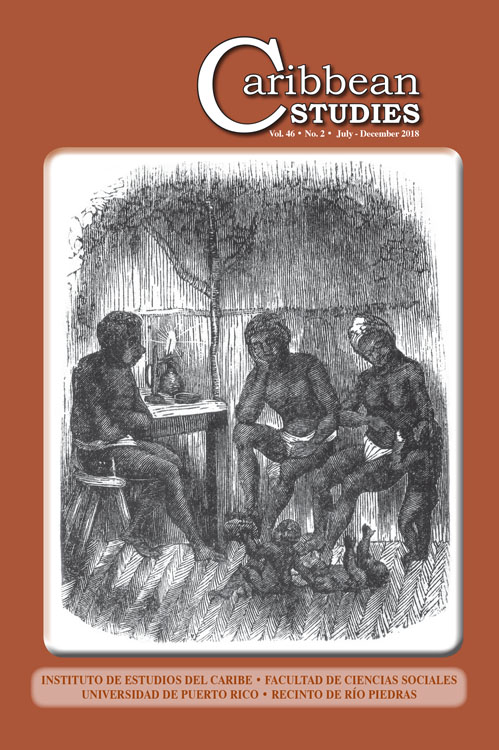Resumen
Los inspectores del Sistema de Asistencia a la Pobreza de Jamaica se encargaban de supervisar y administrar ayuda para los solicitantes. Estos funcionarios representaban a las juntas de las parroquias y protegían los intereses financieros del gobierno, mientras que representaban los intereses de dichos solicitantes. A través de sus interacciones cotidianas, estos inspectores desarrollaban un criterio de pobreza que utilizaban para identificar a aquellas personas que se aprovechaban de
las deficiencias del sistema. En mayo de 1932, el inspector D. Phillips, avisó a un funcionario de la corporación de Kingston y St. Andrew que dos mujeres habían intentado estafar a la Oficina de Asistencia a la Pobreza. Utilizando los archivos de la corporación, exploro los conflictos entre estos inspectores y los pobres y especialmente las mujeres pobres para determinar las maneras en las que estas mujeres negociaron la burocracia del sistema de ayuda a los pobres en Jamaica. También planteo que los archivos del sistema de ayuda para los pobres funcionan como recurso importante para investigar la pobreza, la familia y la niñez.
Citas
Bolland, O. Nigel. 1995. On the March: Labour Rebellions in the British Caribbean, 1934-39. Kingston, Jamaica: Ian Randle Publishers.
Brodber, Erna. 1986. “The Pioneering Miss Amy Bailey.” Jamaica Journal 19 no. 22, pp. 9-14.
Bryan, Patrick. 2002. Philanthropy and Social Welfare: An Historical Survey. Mona, Jamaica: Sir Arthur Lewis Institution of Social and Economic Studies.
———. 2000. The Jamaican People 1880-1902: Race, Class and Social Control.
Barbados, Jamaica and Trinidad: University of the West Indies.
Carter, Henderson. 2012. Labour Pains: Resistance and Protest in Barbados 1838- 1904. Kingston, Jamaica: Ian Randle Publishers.
Carter, Richard. 1991. “The Almshouse Test: Deterring the Poor Under the 1880
Poor Relief Act.” Seminar Paper 1, 1990-1991. Department of History, Cave Hill Campus, Barbados.
De Barros, Juanita. 2014. Reproducing the British Caribbean: Sex, Gender, and Population Politics after Slavery. Chapel Hill: University of North Carolina Press.
Eisner, Gisela. 1961. Jamaica 1830-1939: A Study in Economic Growth. England: Manchester University Press.
Fletcher, Leonard. 1992.”The Evolution of Poor Relief in Barbados 1838-1900.” Journal of Caribbean History 26(2):171-209.
Fox-Piven, Frances and Richard Cloward. 1971. Regulating the Poor: The Functions of Public Welfare. New York: Vintage Books.
French, Joan. 1988. “Colonial Policy towards Women after the 1938 Uprising:The Case of Jamaica.” Caribbean Quarterly 34(3-4). Women in West Indian Literature II, pp. 36-61.
Gregg, Veronica Marie. 2007. “How with this rage shall beauty hold a plea”: The Writings of Miss Amy Beckford Bailey as Moral Education in the Era of Jamaican Nation Building.” Small Axe 23 (vol. 11 no. 2) pp. 16-23
Hart, Richard. 1992. “Origin and Development of the Working Class in the English-Speaking Caribbean Area: 1897-1937. In Labour in the Caribbean, edited by Malcom Cross and Gad Heuman. London: Macmillan Caribbean.
Jamaica Archives, Spanish Town. 1924-1938. Public Local Records Records of the Kingston and St. Andrew Corporation including Minutes of the Corporation Poor House Committee (2/6/171-397).
Jamaica. 1921-1938. Reports of the Board of Supervision in the Annual Report of Jamaica together with Departmental Reports. Duke Street, Jamaica: Government Printer.
Jamaica. 1938. Report of the Committee on Poor Relief and the Management of Poor Houses in Jamaica. Kingston, Jamaica: Government Printing Press.
Jemmott, Jenny. 2015. Ties that Bind: The Black Family in Post-Slavery Jamaica 1834-1882. Jamaica: University of the West Indies Press.
Jones, Cecily. 2007. Engendering Whiteness: White Women and Colonialism in Barbados and North Carolina 1627-1865. Manchester, England: Manchester University Press.
Jones, Margaret. 2013. Public Health in Jamaica 1850-1940: Neglect, Philanthropy and Development. Jamaica, Barbados, Trinidad: University of the West Indies Press.
Lobdell, Richard. 1988. “Women in the Jamaican Labour Force, 1881-1921.”Social and Economic Studies 37(1-2):203-240. Caribbean Economic History, pp. 203-240.
Mohammed, Patricia, and Catherine Shepherd, eds. Gender in Caribbean Development. UWI Women and Development Studies Project. Jamaica, Barbados and Trinidad: Institute of Social and Economic Research, Reprinted 1991.
Macmillan, William. 1971. Warning from the West Indies: A Tract for Africa and the Empire. Freeport, New York: Books for Libraries Press, 1936. Reprinted 1971.
Moore, Brian, and Michelle Johnson. 2004. Neither Led Nor Driven: Contesting British Cultural Imperialism in Jamaica 1865-1920. Barbados, Jamaica and Trinidad: University of the West Indies Press.
Post, K.W.J. 1969. “The Politics of Protest in Jamaica, 1938: Some Problems of Analysis and Conceptualization.” Social and Economic Studies 18(4):374-390.
Simey, T.S. 1946 Welfare and Planning in the West Indies. Oxford: Clarendon Press.
Speirs, Janet. 1999. “Poor Relief and Charity: A Study of Social Ideas and Practices in Post Emancipation Jamaica.” MPhil History, University of the West Indies Mona, Jamaica.
The National Archives, Britain. Colonial Office Series 137 Jamaica, “Governors” Correspondence, Public Offices and Miscellaneous and Individuals.
The National Archives, Britain. Colonial Office Series 950 West India Royal Commission, 1938-1939.
Vassell, Linette. 1998. “Colonial Gender Policy in Jamaica.” Pp. 190-201in Before and After 1865: Education, Politics and Regionalism in the Caribbean, edited by Brian Moore and Swithin Wilmot. Jamaica: Ian Randle Publishers.

